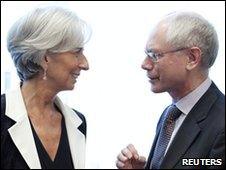EU ministers seek better economic crisis response
- Published

Finance ministers have agreed four main objectives
EU finance ministers have agreed for the need to be tougher on member states' budgets in the wake of the Greek debt crisis.
And following criticism that Europe did too little, too late to defend the euro, they pledged to react quicker and more efficiently in future.
At the first meeting of a new EU economic taskforce, they agreed new sanctions were needed to enforce rules.
Countries that break deficit limits could lose EU money or voting rights.
'Draw lessons'
The meeting in Brussels comes at the end of another week of turmoil on the markets as European countries grapple with the aftermath of the debt crisis in Greece.
The euro fell to its lowest level for four years against the dollar in the last few days and share markets have seen big sell-offs.
With additional concerns about the level of debt in Spain, Portugal and other countries, the fear has been that the crisis could harm the wider European economy.
Herman Van Rompuy, European Council president, said member states had agreed four main objectives:
greater budgetary discipline
to look for ways to reduce the divergences in competitiveness between member states
to establish an effective economic crisis management mechanism
to strengthen economic governance to be able to act quicker and in a more co-ordinated and efficient manner to deal with any future economic crises
He said the meeting was "only the start of the process" of putting these policies in place, but that "there was a strong political will among the European Union finance ministers".
Finance ministers would now start work on establishing a comprehensive, formal agreement, he said.
Mr Van Rompuy added that the taskforce wanted to "draw the lessons" from the current crisis centred on Greece.
"In the past, corrective measures were taken too late, the available legal instruments were not used sufficiently," he said.
"That's why we need to act in a number of ways."
'On the case'
BBC economics editor Stephanie Flanders said the ministers had made a start by agreeing that they needed to agree new rules - the message for the moment was: 'We're on the case.'
Chancellor George Osborne said the UK government was keen "to show that we are serious about living within our means".
"Britain has the largest budget deficit in the EU and I'm very conscious of that and that's why in Britain we're going to accelerate the reduction of that deficit," he said.
Christine Lagarde, France's Minister of Economic Affairs, said the taskforce had to "focus on what is deliverable quickly".
She added: "We will continue to focus on what we can achieve in the short-term, because it's really what is guiding us at the moment is being pragmatic."
The EU taskforce comprises finance ministers from all 27 member nations of the European Union, European Central Bank President Jean-Claude Trichet, EU Commissioner for Economic and Financial Affairs Olli Rehn, Eurogroup President Jean-Claude Juncker, and Mr Van Rompuy.
Its first meeting finished after the main European share indexes had finished Friday trading.
The main UK, French and German indexes had lost more than 2% at lunchtime, with London's FTSE 100 below 5,000 for the first time since November, but all recovered towards the end of the day.
In London, the FTSE ended down 0.2% to 5,063 and Germany's Dax finishing 0.7% lower.
Meanwhile, the Dow Jones later ended up 1.3%.